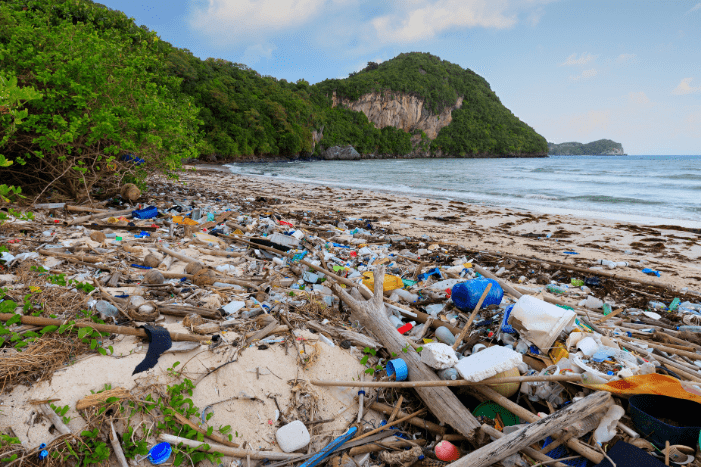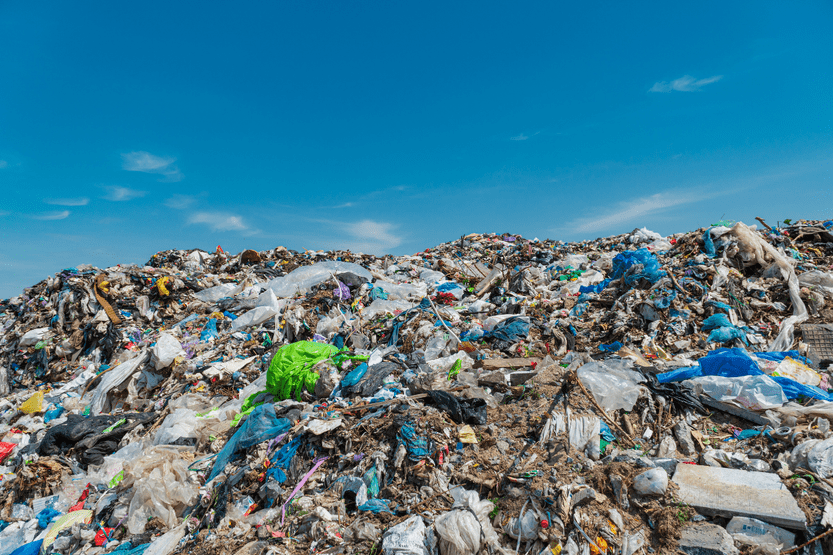Fundamental to the concept of sustainability—meeting today’s needs without diminishing the ability of future generations to meet their own—is the idea that all used materials can be designed to be recovered and used again rather than thrown away.
Currently, our production and waste management systems do not embrace this “zero-waste” imperative. Instead, an overwhelming number of products and packaging are designed to be used once and disposed of, and most are contaminated with toxic chemicals. Of the over 86,000 chemicals registered in the U.S., the majority have not been tested for human safety, and many suspected and even known carcinogens–cancer-causing chemicals–are in the products we use and commonly manufacture today.


Fundamental to the concept of sustainability—meeting today’s needs without diminishing the ability of future generations to meet their own—is the idea that all used materials can be designed to be recovered and used again rather than thrown away.
Currently, our production and waste management systems do not embrace this “zero-waste” imperative. Instead, an overwhelming number of products and packaging are designed to be used once and disposed of, and most are contaminated with toxic chemicals. Of the over 86,000 chemicals registered in the U.S., the majority have not been tested for human safety, and many suspected and even known carcinogens–cancer-causing chemicals–are in the products we use and commonly manufacture today.
82% of small businesses polled believe businesses should be required to share chemical ingredient information all along the supply chain, from chemical manufacturer to end-product manufacturer. (ASBC Business Case for EPA Action on Clean Water, 2018)
86,000 consumer chemicals registered with the EPA; the majority have never been tested for toxicity. (The Guardian, 2023)
Exposure to hazardous chemicals costs the U.S. an estimated $340 billion per year in healthcare expenses and lost productivity. (The Lancet, 2021)
A systems-level overhaul of chemical and product manufacturing, materials design, and after-use is vital for the protection of our planet and people. The American Sustainable Business Network’s (ASBN) Safer Chemicals work develops principles and promotes policies for more robust chemical safety in workplaces, homes, communities, and the natural environment. This work is based on fully informed assessments of synthetic chemical exposure hazards—whether the risk of harm in each case is broadly acceptable or demands safer alternatives.
The Safer Chemicals & Circular Economy Steering Committee seeks to reduce the health impacts chemicals are having on human health and the environment. Progress is based on four principles:

A systems-level overhaul of chemical and product manufacturing, materials design, and after-use is vital for the protection of our planet and people. The American Sustainable Business Network’s (ASBN) Safer Chemicals work develops principles and promotes policies for more robust chemical safety in workplaces, homes, communities, and the natural environment. This work is based on fully informed assessments of synthetic chemical exposure hazards—whether the risk of harm in each case is broadly acceptable or demands safer alternatives.

The Safer Chemicals & Circular Economy Steering Committee seeks to reduce the health impacts chemicals are having on human health and the environment. Progress is based on four principles:
Circularity, a sustainable closed-loop model in which all used materials become feedstocks for new materials, must be central to the new regenerative economy.
1
Improve materials’ circularity by eliminating waste from industrial design and manufacturing, prioritizing material recovery and reuse, and promoting the uncontaminated collection of recyclables and compostables.
2
Improve materials’ circularity by eliminating the use of hazardous substances which, when reused, contaminate recyclables and compostables.
3
Create human-centered economies that proactively promote equity and inclusion in policy-making, hiring, and leadership, and directly engage frontline industrial communities in planning, negotiation, implementation, and evaluation processes.
4
Advance models of shared responsibility between governments, producers, materials management providers, retailers, and consumers.
5
Accelerate circular markets by funding and incentivizing innovative technologies and practices, education and training, and “cradle-to-grave” product life cycle solutions.
6
Set circular standards and measure outcomes to ensure policy stability, a level playing field, and full transparency and accountability among all parties.
Establishing this new paradigm is the mission of the Safer Chemicals & Circular Steering Committee, which supports new business models, investment practices, and public policies that spur the transition to a circular economy and support green chemistry and safer chemicals policies.

45% of emissions from materials production: Nearly half of global greenhouse gas emissions come from producing materials like plastics, metals, cement, and chemicals.
(Ellen MacArthur Foundation, 2022)
92 billion tons of materials extracted yearly: Global material consumption has reached 92 billion metric tons annually, with only 8.6% of those materials being cycled back into the economy.
(Circle Economy, 2022)


Globally, garment production doubled from 2000 to 2014, while the number of times people wear an item dropped by 36 percent.
(Ellen MacArthur Foundation)


Businesses Unite Behind Safer Choice
ASBN has partnered with the Household & Commercial Products Association (HCPA), Worldwide Cleaning Industry Association (ISSA), Change Chemistry and the Interfaith Center for Corporate Responsibility (ICCR) on a coalition letter to demonstrate our united support for the U.S. Environmental Protection Agency’s (EPA) Safer Choice program.
As a voluntary partnership program, Safer Choice collaborates with the business community to introduce safer products and chemicals into the marketplace, creating an incentive for ongoing innovation. More than 400 businesses actively use the Safer Choice labels on their products, while thousands of businesses sell or use Safer Choice products, and nearly 2000 Safer Choice-certified products are currently available.
State & Federal PFAS Campaigns
Many businesses have taken the initiative to make products safer, more sustainable and free from harmful chemicals, including the class of chemicals known as “PFAS.” Listening to the demands of consumers and governments, these manufacturers and retailers have found that making and selling products without harmful chemicals is both safer and profitable. If your business is already PFAS-free, it’s important for you to sign the pledge. We pursue campaign efforts at the federal and state levels as policy opportunities become possible. Sign up today so we can reach out to you with relevant updates!
Childhood Cancer Prevention Initiative
While it’s true that fewer children are dying of cancer than in the past, the rate of children being diagnosed with cancer has actually increased.
Between 1975 and 2018, incidence rates among those under age 20 increased by 41 percent. Businesses have a vital role to play. We need to act now to end the use of toxic chemicals associated with cancers where children live, learn and play, and in the products they use.
In 2016, ASBN co-founded the Childhood Cancer Prevention Initiative. In 2019, ASBN collaborated with a team of over 60 stakeholders and leaders in the Health, Science, Business, Policy and Advocacy sectors on the Childhood Cancer: Cross-Sector Strategies for Prevention report, leading to symposiums, webinars, sign-ons and other actions.
In 2015, ASBN’s affiliate policy organization, the American Sustainable Business Council (ASBC), built and led the Companies for Safer Chemicals campaign with partners including actress, activist and founder of The Honest Company, Jessica Alba, who worked collectively to promote TSCA reform that led to the successful passage of the Frank R. Lautenberg Chemical Safety for the 21st Century Act in 2016. We also worked with NGO partners to advance successful safer chemical bills in states across the country.


In 2015, ASBN’s affiliate policy organization, the American Sustainable Business Council (ASBC), built and led the Companies for Safer Chemicals campaign with partners including actress, activist and founder of The Honest Company, Jessica Alba, who worked collectively to promote TSCA reform that led to the successful passage of the Frank R. Lautenberg Chemical Safety for the 21st Century Act in 2016. We also worked with NGO partners to advance successful safer chemical bills in states across the country.
Developed policies governing poly- and per-fluorinated alkyl substances (PFAS), and successfully advocated at both state and federal levels for PFAS regulations.
Lobbied for passage of the California Plastic Pollution Prevention and Packaging Producer Responsibility Act.
ASBN Co-presented the first Childhood Cancer Prevention Symposium with Prep4Gold and the other partners of the Childhood Cancer Prevention Initiative.
Coordinating a business response to the Federal Trade Commission’s regulation of greenwashing and revisions to its Green Guides.
Worked with coalition partners to pass the Federal Safer Cosmetics Act.
Delivered a report and collaborative briefing on Sustainable Chemistry to the White House Office of Science and Technology Policy.
Provided testimony at the Energy and Climate Change House Subcommittee Hearing on Recycling.
Worked with coalition partners to pass the California Cosmetic Products Flavor and Fragrance Act.
ASBN named EPA Safer Choice Partners of the Year for two years.
ASBN collaborated with a team of over 60 stakeholders and leaders in the Health, Science, Business, Policy and Advocacy sectors on the Childhood Cancer: Cross-Sector Strategies for Prevention report, leading to symposiums, webinars, sign-on and other actions.
The Ingredients Disclosure Working Group was part of a coalition that passed the California Cleaning Product Right to Know Act, the first law in the US to require this disclosure.
Co-launched the Childhood Cancer Prevention Initiative, a collaborative effort to improve children’s health by sharing evidence and resources about the impact of toxic chemicals on children; removing toxic chemicals from products and environments to which they’re exposed; and encouraging legislators to implement responsible state and federal policies.
Campaigned for the successful passage of the Lautenberg Chemical Safety Act, a badly needed revision of the Federal Toxic Substances Control Act.
Many working group members have pledged to ask their suppliers about the presence of the following chemicals of concern in the products they produce, specify or purchase: brominated flame retardant chemicals, fluorinated stain treatments, PFAS, carcinogenic and reprotoxic antimicrobials, polyvinyl chloride (vinyl), and VOCs, including formaldehyde.
Martin Wolf, our Senior Advisor on Safer Chemicals & Circular Economy, is available for speaking engagements and presentations on related topics.